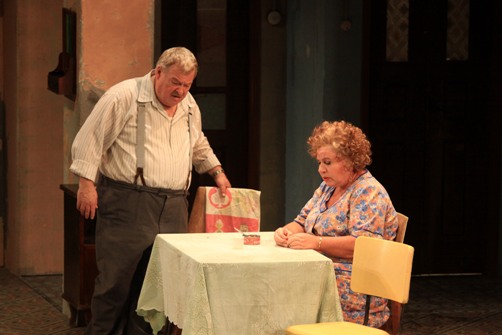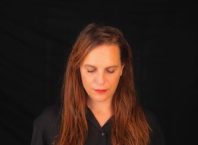
Twenty five years after the war, caught between the nightmares of yesterday and their fantasies of tomorrow, the Marinsky family can barely make ends meet with their small grocery store in Jaffa. The Cameri-Beit Lessin co-production of Grocery Store, written and directed by Hillel Mitelpunkt, recreates the atmosphere and mood of that distant time through one family’s story, and in doing so offers a better understanding of the complex relationship Israel has to the past.
Jaffa of 1970 is ages away from the international urban center that Tel Aviv-Jaffa has become. Israel was much more isolated at that time – not only were there no personal computers or internet, there was only one state-owned television channel, and that was in black and white. Life in Israel has altered dramatically in the interval, in almost every dimension, and it is hard to imagine the difficult circumstances and limited opportunities of those times. It was all the more difficult for those who came as refugees from Europe after World War II: families devastated by war, without the financial, social, or emotional resources essential to making a new start in what was for them, a strange new country – a country taking its own unsteady first steps.
After the War of Independence, many of these refugees were settled by the newly established government of Israel in Jaffa in the now empty homes that had belonged to Arab families, so that there was a community of European refugees in the post-war years in Jaffa. Outsiders caught between two worlds – their sense of identity rooted in a Jewish-European past and culture that no longer existed, feeling like strangers trying to learn a new language and culture, denied even a voice, because no one wanted to hear about their experiences “over there,” much less their difficulties in Israel. Mittelpunkt has explored this political-emotional terrain in Anda, centered on the politics of the Eichmann trial testimony, which won the Israeli Theatre Award for Best Play, and for Mittelpunkt, Best Playwright in 2009. Grocery Store is a much earlier play, which was first produced by Habima National Theatre in 1982, yet it still speaks eloquently for this overlooked and often silenced segment of Israeli society.
Grocery Store takes an intimate, close look into the home and lives of these outsiders.
The narrative centers on the store itself, which has literally overtaken the lives of the family. Neta Haker’s set illustrates the encroachment of the store, adjacent to the family apartment, its contents spilling over into the family living room/kitchen, with the son’s bed in one corner of the room, a barrel of herring at his feet. In these close quarters, it is no wonder that relationships are strained. Leitsche (Tiki Dayan) and Yossl (Avi Oria) and their son Tanchum (Yaniv Levy) live with Yossl’s father Dov Bear (Yossi Graber) and brother Aharele (Itzhak Heskia), but the feeling is not one of a family tribe, but of people forced by circumstances into reluctant intimacy.
Each family member fantasizes about a different sort of life, one that is not marked by failure, deprivation and denial. Leitsche and Yossl hope that Dov Bear will receive reparations from Germany, enabling them to sell their store and improve their lot in life by moving to Bat Yam, Dov however, has plans of his own, and Tanchum, the son, falls for one misguided scheme after another. Mittelpunkt, with the excellent ensemble cast, allows us to see the characters in all their weakness, dreams and complexities. The portrait is unvarnished, each family member is fully revealed, and the result is not complimentary, but has an integrity that evokes empathy.
Yossi Graber, as Dov Bear the grandfather who knows full well that he is tolerated in the household because he is eligible for reparations, yet falls prey to the feminine wiles of a neighbor, gives a strong, impassioned performance. Avi Oria brings warmth to the weak and amiable Yossl, whose assertion of his independence and realization of his dreams never extends beyond buying yet another unnecessary electrical appliance. Yet it is the matriarch of the family, Tiki Dayan as Leitsche, who made the strongest impression on this writer. The ultimate Polish-Jewish mother, she succeeds in embodying the cliché entirely, yet transcends it in her humanity, conveying an internal struggle of strength, denial, repression, vulnerability, and compassion.






[…] about a different sort of life, one that is not marked by failure, deprivation and denial…read more Performances thru March 19, 2011 at the Eretz Israel Museum in Ramat Aviv, Tickets: […]
Comments are closed.